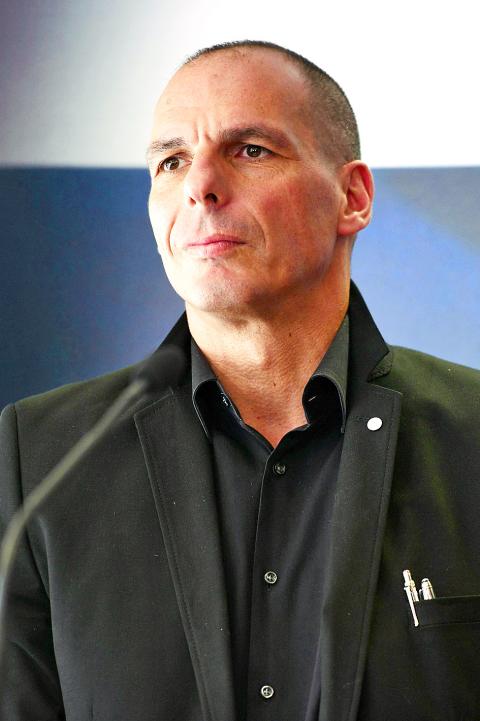Greek Minister of Finance Yanis Varoufakis on Saturday said that Greece would not require a new bailout from its international creditors if they would simply restructure its debt.
Athens last week resumed talks with its creditors in a bid to unblock 7.2 billion euros (US$8.06 billion) from its EU-IMF bailout before state coffers run dry.
Analysts believe that even if it manages to secure the last tranche of aid, Athens might have to obtain a new rescue package to stay afloat.

Photo: AFP
However, the Greek finance minister said that Greece could do without a new bailout.
“One of the conditions for this to happen though, is an important restructuring of the debt,” he told the Efimerida ton Sindakton daily in an interview published on Saturday.
The radical-left SYRIZA government came into power in January on a campaign promise that it would seek to get part of its debt written off.
However, its creditors — the EU, the European Central Bank and the IMF — have reiterated that that is impossible. Varoufakis, whose negotiating style has irritated his EU counterparts, also took a swipe at the eurozone in the interview, saying that if it “doesn’t change it will die.”
He added that “no country, not only Greece, should have joined such a shaky common monetary system.”
Nevertheless, Varoufakis said it was “one thing to say we shouldn’t have joined the euro and it is another to say that we have to leave” because backtracking now would lead to “an unforeseen negative situation.”
Asked about reported insults from fellow Eurogroup ministers of finance during a tense meeting in Riga on April 24, Varoufakis was also dismissive.
Media reports said he had been branded a “gambler,” an “amateur” and an “adventurist” by his peers.
“Those would have surely been heavy offenses if they had been expressed, but they were not,” Varoufakis said.
Athens is struggling to pay salaries and pensions without the promised loans. Almost a billion euros in debt and interest is also due for repayment to the IMF by Tuesday next week.
Unless an agreement is reached to unlock the remaining EU-IMF bailout money, the debt-ridden country faces default and a possible exit from the euro.

SEMICONDUCTORS: The German laser and plasma generator company will expand its local services as its specialized offerings support Taiwan’s semiconductor industries Trumpf SE + Co KG, a global leader in supplying laser technology and plasma generators used in chip production, is expanding its investments in Taiwan in an effort to deeply integrate into the global semiconductor supply chain in the pursuit of growth. The company, headquartered in Ditzingen, Germany, has invested significantly in a newly inaugurated regional technical center for plasma generators in Taoyuan, its latest expansion in Taiwan after being engaged in various industries for more than 25 years. The center, the first of its kind Trumpf built outside Germany, aims to serve customers from Taiwan, Japan, Southeast Asia and South Korea,

Gasoline and diesel prices at domestic fuel stations are to fall NT$0.2 per liter this week, down for a second consecutive week, CPC Corp, Taiwan (台灣中油) and Formosa Petrochemical Corp (台塑石化) announced yesterday. Effective today, gasoline prices at CPC and Formosa stations are to drop to NT$26.4, NT$27.9 and NT$29.9 per liter for 92, 95 and 98-octane unleaded gasoline respectively, the companies said in separate statements. The price of premium diesel is to fall to NT$24.8 per liter at CPC stations and NT$24.6 at Formosa pumps, they said. The price adjustments came even as international crude oil prices rose last week, as traders

Taiwan Semiconductor Manufacturing Co (TSMC, 台積電), which supplies advanced chips to Nvidia Corp and Apple Inc, yesterday reported NT$1.046 trillion (US$33.1 billion) in revenue for last quarter, driven by constantly strong demand for artificial intelligence (AI) chips, falling in the upper end of its forecast. Based on TSMC’s financial guidance, revenue would expand about 22 percent sequentially to the range from US$32.2 billion to US$33.4 billion during the final quarter of 2024, it told investors in October last year. Last year in total, revenue jumped 31.61 percent to NT$3.81 trillion, compared with NT$2.89 trillion generated in the year before, according to

SIZE MATTERS: TSMC started phasing out 8-inch wafer production last year, while Samsung is more aggressively retiring 8-inch capacity, TrendForce said Chipmakers are expected to raise prices of 8-inch wafers by up to 20 percent this year on concern over supply constraints as major contract chipmakers Taiwan Semiconductor Manufacturing Co (TSMC, 台積電) and Samsung Electronics Co gradually retire less advanced wafer capacity, TrendForce Corp (集邦科技) said yesterday. It is the first significant across-the-board price hike since a global semiconductor correction in 2023, the Taipei-based market researcher said in a report. Global 8-inch wafer capacity slid 0.3 percent year-on-year last year, although 8-inch wafer prices still hovered at relatively stable levels throughout the year, TrendForce said. The downward trend is expected to continue this year,